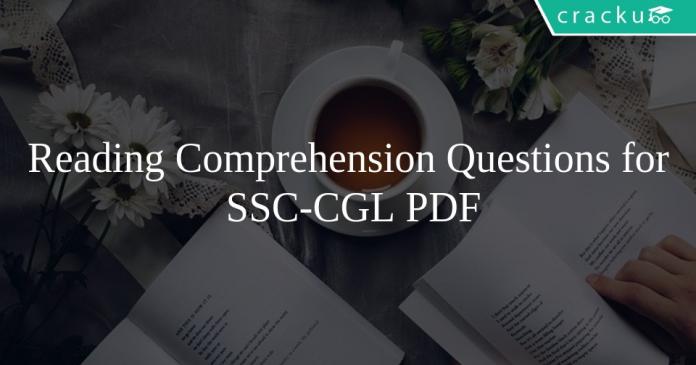Reading Comprehension Questions for SSC-CGL PDF
Download SSC CGL Reading Comprehension Questions with answers set-2 PDF based on previous papers very useful for SSC CGL exams. Very Important Reading Comprehension Questions for SSC exams.
Download Reading Comprehension Questions for SSC-CGL
Get 790+ mocks for Rs. 100 – Coupon GOVTJOB
Instructions
A passage is given with five questions following it. Read the passage carefully and select the best answer to each question out of the given four alternatives.
Corruption is not a new phenomenon in India. It has been prevalent in society since ancient times. History reveals that it was present even in the Mauryan period. Great scholar, Kautilya, mentions the pressure of forty types of corruption in his contemporary society. It was practised even in Mughal and Sultanate period. When the East India Company took control of the country, corruption reached new height. Corruption in India has become so common that people now are averse to thinking of public life with it. Corruption has been defined variously by scholars. But the simple meaning of it is that corruption implies perversion of morality, integrity, character or duty out of mercenary motives, i.e. bribery, without any regard to honour, right and justice. In other words, undue favour for any one for some monetary or other gains is corruption. Simultaneously, depriving the genuinely deserving from their right or privilege is also a corrupt practice. Shrinking from one’s duty or dereliction of duty are also forms of corruption. Besides, thefts, wastage of public property constitute varieties of corruption. Dishonesty, exploitation, malpractices, scams and scandals are various manifestations of corruption.
Question 1: According to the passage, what all are the manifestation of corruption?
a) malpractices
b) dishonesty
c) scams and scandals
d) All of these
Question 2: Perversion of what is not mentioned in the passage?
a) character
b) attitude
c) morality
d) integrity
Question 3: According to the passage, corruption is _____ .
a) new phenomenon in India
b) insignificant to Indian society
c) prevalent since ancient times
d) prevalent only in middle east countries
Instructions
A passage is given with five questions following it. Read the passage carefully and select the best answer to each question out of the given four alternatives.
Corruption is not a uniquely Indian phenomenon. It is witnessed all over the world in developing as well as developed countries. It has spread its tentacles in every sphere of life, namely business administration, politics, officialdom, and services. In fact, there is hardly any sector which can be characterised for not being infected with the vices of corruption. Corruption is rampant in every segment and every section of society, barring the social status attached to it. Nobody can be considered free from corruption from a high ranking officer.
To root out the evil of corruption from society, we need to make a comprehensive code of conduct for politicians, legislatures, bureaucrats, and such code should be strictly enforced. Judiciary should be given more independence and initiatives on issues related to corruption. Special courts should be set-up to take up such issues and speedy trial is to be promoted. Law and order machinery should be allowed to work without political interference. NGOs and media should come forward to create awareness against corruption in society and educate people to combat this evil. Only then we would be able to save our system from being collapsed.
Question 4: According to the passage, which of the following is INCORRECT?
a) corruption is prevalent only in developing countries
b) corruption is rampant in every segment and section of society
c) to combat corruption, law and order should be allowed to work without political interference
d) corruption is not a uniquely Indian phenomena
Question 5: Which of the following measure is not mentioned in the passage to root out the evil of corruption from society?
a) private sector should create awareness against corruption
b) media should come forward to create awareness and educate people to combat this evil
c) judiciary to be given more independence and initiative in relation to corruption
d) comprehensive code of conduct for politicians, legislature and bureaucrats
SSC CGL Previous Papers Download PDF
Question 6: According to the passage, who is free from corruption?
a) high ranking officers
b) politicians
c) bureaucrats
d) None of these
Question 7: According to the passage where does corruption has spread its tentacles?
a) officialdom
b) politics
c) business administration
d) All of these
Instructions
A passage is given with five questions following it. Read the passage carefully and select the best answer to each question out of the given four alternatives. Keeping employees happy, motivated, and on the payroll is one of the key concerns to businesses these days because it’s an open market for top talent. A good employee can walk out of the door today and have a comparable or better job tomorrow. Which brings up a very important question: what would the companies do to keep away that person from even thinking about going to work elsewhere? Gone are the days when the monthly paycheck and two weeks’ vacation a year were enough to keep employees happy. Employers must come up with irresistible incentives to keep top talent onboard. The results of a recent survey by Fortune Magazine on why people leave their jobs shows that 30 percent leave for better compensation and benefits, 27 percent for a better career opportunity, 27 percent for new experience, 21 percent are dissatisfied with opportunities at current job, and 16 percent desire to change careers or industries. Money is no longer the only major motivator. So, is this an onsite daycare center for working parents? Paying for all or part of their health insurance? Or offering educational assistance or paying for certification? On an annual ski trip, paid foreign tours, onsite car washes and oil changes? Or free laundry and dry cleaning facilities? Or prized stock options? Well it could be anything as long as it can keep the employees motivated. There are perks other than monetary gains or raise in pay package which can make employees feel happy and satisfied and the feel good factor.
Question 8: What can be the suitable title for the passage?
a) Incentives to employees
b) Money – a major motivator for employees
c) Giving employees a feel good factor
d) Challenges to keep employees onboard
Question 9: Which of the following reason is not being mentioned in the passage in regard to people leaving their jobs?
a) family constraints especially after getting married
b) dissatisfaction with opportunities at current job
c) better compensation and benefits in new job
d) to have a new experience
Question 10: According to the passage, what is not the key concern of the businesses these days?
a) happiness of employees
b) motivating employees
c) keeping employees on payroll
d) criticizing the employees performance
Instructions
A passage is given with five questions following it. Read the passage carefully and select the best answer to each question out of the given four alternatives.
Superstitions are a universal phenomena having their own peculiar place in the cultural ethos and milieu of a people. They epitomize man’s fear of the unknown, fear of evil, blind faith in omens and portents. Superstitions are inter-woven with myth, legend, unnatural phenomena and disaster, customs and traditions, and are mainly the outcome of ignorance. They are unreasoned and irrational beliefs that gradually become matters of faith. When certain things and happenings are rationally inexplicable people tend to assign mysterious and supernatural reasons for their operation. Thus a natural disaster is explained in terms of God’s wrath and the failure of one’s project is assigned to the black cat which crossed the path just as one set out on the errand. The primitive human beings were mainly governed by superstitions. Superstitions were widespread before the dawn of civilization when science had not advanced. Thus, ignorance of the primitive people and the resultant growth of superstitions were the direct outcome of the lack of scientific advancement. Unenlightened people always tend to be superstitious. The belief in the sanctity of time and old traditions of the ancestors bind the people into knots of superstitious thought.
Besides, the unscrupulous priests and religious officials exercise a dominating, unhealthy effect upon the people believing in religious orthodoxy. They encourage superstitions for their own ulterior motives. Superstitions are not only universally prevalent but even have strikingly common features whether believed in India or in as far off a place as Canada. There are some common superstitions which are shared by people all over the world. Beliefs in spirits, ghosts and witches and reincarnation are quite common among all the peoples of the world. Belief in witches still prevails in India, France, Scotland, England and many other countries. In countries of the East, especially in India, belief in ghosts and spirits still exists. The cries of certain birds like owls and ravens and the howl of cats are regarded with superstition as portents of evil throughout the world. Then there is a very common belief that the sighting of comets portends the death of kings or great men or some unforeseen catastrophe. Shakespeare refers to such a superstition in his Julius Ceaser, Halley’s Comet in the twentieth century evoked a similar response in many a mind.
Question 11: According to passage which of the following is not regarded as a superstition by the people?
a) howl of cats
b) cries of children
c) crossing of path by black cat
d) sighting of comets
Question 12: Which of the following is INCORRECT with respect to passage?
a) superstitions is also prevailing in Canada
b) superstitions are a universal phenomena
c) superstitions are unreasoned and rational beliefs
d) a natural disaster is regarded as a god’s wrath by the superstitious people
Instructions
A passage is given with five questions following it. Read the passage carefully and select the best answer to each question out of the given four alternatives.
The size of the workforce in Brazil, the number of kids at home and parents to sustain will obviously have a great impact on the extent of poverty in Brazilian households. In fact, the demographic transition that has been ongoing in Brazil for the past few decades has helped a lot in reducing poverty. Less children were born in poorer families and that’s less children that ended up involved in street violence, drugs, gangs and so on. More parents were then able to push their kids to go to school and get an education. Of course, the situation is still pretty bad in Brazilian slums (favelas), but it’s estimated that the demographic transition had an impact equivalent to + 0.5% in GDP
growth, which is not bad at all considering that the average GDP growth (per capita) was about 3% per year at the time. And since this transition happened over 30 years, its impact on the economy is equal to around 15% of growth in GDP (over three decades). Overall, the change in the family structure and in Brazilians’ lifestyle has had a much greater impact on reducing poverty than the speed of the demographic transition itself. On the other hand, the transition did have an influence on wages (e.g. supply of labor) and interest rates in a way that worsened poverty in Brazil (less overall income).
Question 13: What does the term ‘favelas’ used in the passage refers to?
a) street kids
b) slums in brazil
c) interest rates prevaling in brazil
d) labour supply
Question 14: According to the passage, Brazilian children born in poorer families were not involved in which kind of activity so often?
a) bullying
b) street violence
c) gangs
d) drugs
Question 15: According to the passage, which of the following doesn’t have an impact on the extent of poverty in Brazilian households?
a) number of kids at home
b) size of the workforce
c) parents
d) nature of job
18000+ Questions – Free SSC Study Material
Answers & Solutions:
1) Answer (D)
2) Answer (B)
3) Answer (C)
4) Answer (A)
5) Answer (A)
6) Answer (D)
7) Answer (D)
8) Answer (C)
9) Answer (A)
10) Answer (D)
11) Answer (B)
12) Answer (C)
13) Answer (B)
14) Answer (A)
15) Answer (D)
We hope this Reading Comprehension Questions for SSC CGL Exam preparation is so helpful to you.





